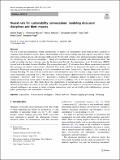| dc.contributor.author | Pugh, Katrina | |
| dc.contributor.author | Musavi, Mohamad | |
| dc.contributor.author | Johnson, Teresa | |
| dc.contributor.author | Burke, Christopher | |
| dc.contributor.author | Yoeli, Erez | |
| dc.contributor.author | Currie, Emily | |
| dc.contributor.author | Pugh, Benjamin | |
| dc.date.accessioned | 2023-09-21T19:46:15Z | |
| dc.date.available | 2023-09-21T19:46:15Z | |
| dc.date.issued | 2023-09-01 | |
| dc.identifier.uri | https://hdl.handle.net/1721.1/152194 | |
| dc.description.abstract | Abstract
We live in the age polarization, where conversations on matters of sustainability more often produce acrimony or stalemate than productive action. Better understanding conversation features and their impacts may lead to better innovation, solution-design, and ongoing collaboration. We describe a study to test alternate machine learning models for classifying six “discussion disciplines”, which are conversation features associated with rhetorical intent. The model providing the best outcome used the Bi-directional Encoder Representations from Transformers (BERT) layered with a Residual Network (ResNet). The training data were 1135 utterances from Maine aquaculture town hall-like meetings and similar conversations, which had been hand-coded for the discussion disciplines. In addition, we generated 300 phrases corresponding to three conversation outcomes: Intent-to-Act, Options-Generation, and Relationship-Building. We then used the trained model and information retrieval to classify a large corpus of 591 open-source transcripts, containing over 21,000 utterances. A binary logistic regression analysis showed that two discussion disciplines, “Inclusion” and “Courtesy,” had positive, statistically significant, impacts on Intent-to-act: a 10 percentage point increase in the share of the Inclusion or Courtesy yielded a 45% or 34% increase, respectively, in the likelihood of Intent-to-Act. This study shows the applicability of neural networks in modeling conversations and identifying the dialog acts that can provide measurable and predictable impact on conversation outcomes. Conversational intelligence can support a variety of human interactions, such as town halls, policy-deliberations, private–public partnerships, and sustainability teamwork. | en_US |
| dc.publisher | Springer London | en_US |
| dc.relation.isversionof | https://doi.org/10.1007/s00521-023-08819-z | en_US |
| dc.rights | Creative Commons Attribution | en_US |
| dc.rights.uri | https://creativecommons.org/licenses/by/4.0/ | en_US |
| dc.source | Springer London | en_US |
| dc.title | Neural nets for sustainability conversations: modeling discussion disciplines and their impacts | en_US |
| dc.type | Article | en_US |
| dc.identifier.citation | Pugh, Katrina, Musavi, Mohamad, Johnson, Teresa, Burke, Christopher, Yoeli, Erez et al. 2023. "Neural nets for sustainability conversations: modeling discussion disciplines and their impacts." | |
| dc.contributor.department | Sloan School of Management | |
| dc.identifier.mitlicense | PUBLISHER_CC | |
| dc.eprint.version | Final published version | en_US |
| dc.type.uri | http://purl.org/eprint/type/JournalArticle | en_US |
| eprint.status | http://purl.org/eprint/status/PeerReviewed | en_US |
| dc.date.updated | 2023-09-17T03:09:59Z | |
| dc.language.rfc3066 | en | |
| dc.rights.holder | The Author(s) | |
| dspace.embargo.terms | N | |
| dspace.date.submission | 2023-09-17T03:09:59Z | |
| mit.license | PUBLISHER_CC | |
| mit.metadata.status | Authority Work and Publication Information Needed | en_US |
